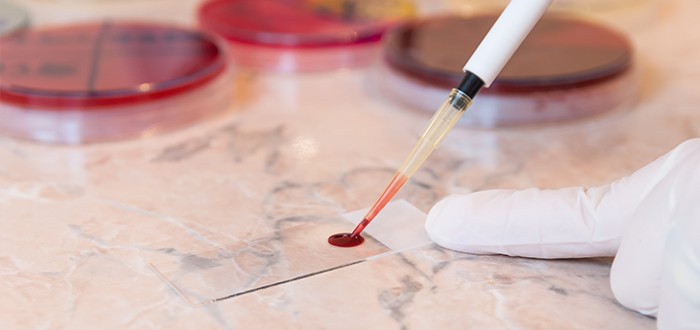A test that can detect mesothelioma years before it strikes you would offer a powerful edge in the fight for survival following diagnosis, according to scientists from the University of Western Australia.
Such a test appears soon to be available. It’s called the ENOX2 blood test. And, according to a recent research paper, it may be able to warn of mesothelioma as far as a decade ahead of onset.
The research reveals that patients exposed to asbestos appear to exhibit in their blood telltale signs of mesothelioma’s coming well in advance.
But don’t get too excited. The researchers caution that their observations still must be validated. That means another study, and a bigger one at that.
The just-published study appears in the journal Clinical Proteomics. The title of the study is “ENOX2-Based Early Detection of Asbestos-Induced Malignant Mesothelioma 4–10 Years in Advance of Clinical Symptoms.”
ENOX2 Blood Test Is Available
ENOX stands for ecto nicotinamide dinucleotide oxidase disulfide. It’s a protein and there are two types of it. Conveniently, they are labeled ENOX1 and ENOX2.
ENOX1 exists in normal cells and is vital to the smooth functioning of those cells. ENOX2 is exclusive to cancer cells.
As cancer cells metabolize, some of the ENOX2 protein dribbles out into the blood. Since ENOX2 is not normally present in blood, detection of it there can only mean one thing — cancer.
The blood test that detects both these proteins is already commercially available. It’s called Oncoblot. According to the company that makes the test, it has an accuracy rate above 95 percent.
“ENOX2 belongs to a family of cell surface proteins that oxidize reduced pyridine nucleotides and are essential for cell enlargement and growth,” the researchers wrote.
“These ENOX2 proteins are shed into the circulation and can be detected in some early stage cancers, including: breast, lung, colon, prostate and ovarian cancer,” they continued.
However, Oncoblot has not been used before to detect mesothelioma-specific ENOX2 cells. The researchers said they wanted to see if Oncoblot could do this.
“The present study was undertaken to determine if cancer-specific ENOX2 transcript variants might serve as biomarkers to detect the presence of malignant mesothelioma in advance of clinical symptoms,” they wrote.
Blood Test Study Involved Mesothelioma Victims
The study involved gathering two sets of patients. The first was made up of people who had been confirmed as having mesothelioma. The second was made up of people confirmed as not having mesothelioma, but who were exposed to asbestos at some point in the past.
The researchers located 17 patients for the first group. All of them had malignant pleural mesothelioma. None had the peritoneal form of it. For most, their mesothelioma was of the epithelioid type.
The first group was also overwhelmingly made up of men. The median age of these subjects at the time of diagnosis was 67.
For the second group, the researchers recruited 15 asbestos-exposed individuals. None had mesothelioma and none showed any symptoms of it. Like the first group, they were mostly elderly men.
As the study progressed, the researchers noted that ENOX2 was present in the blood of members of both groups.
Of keen interest to the researchers was their discovery that seven of the mesothelioma patients in the first group had been leaking ENOX2 proteins anywhere from four to 10 years before onset.
“This is an exciting finding and implies that production of ENOX2 proteins are an early event in carcinogenesis,” they wrote. “To our knowledge, this is the earliest prediagnostic indicator of cancer thus far reported.”


